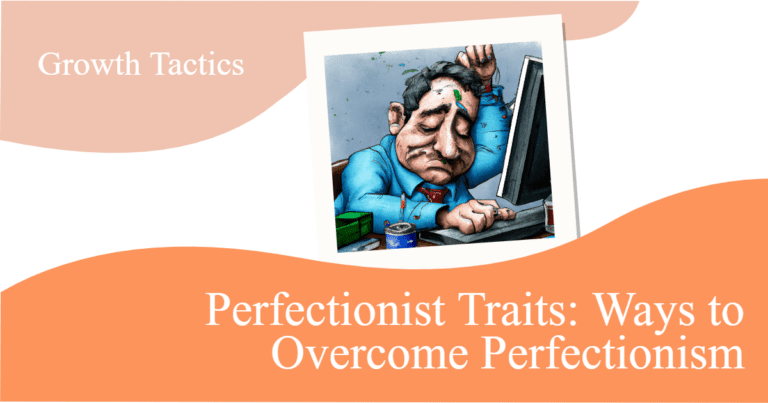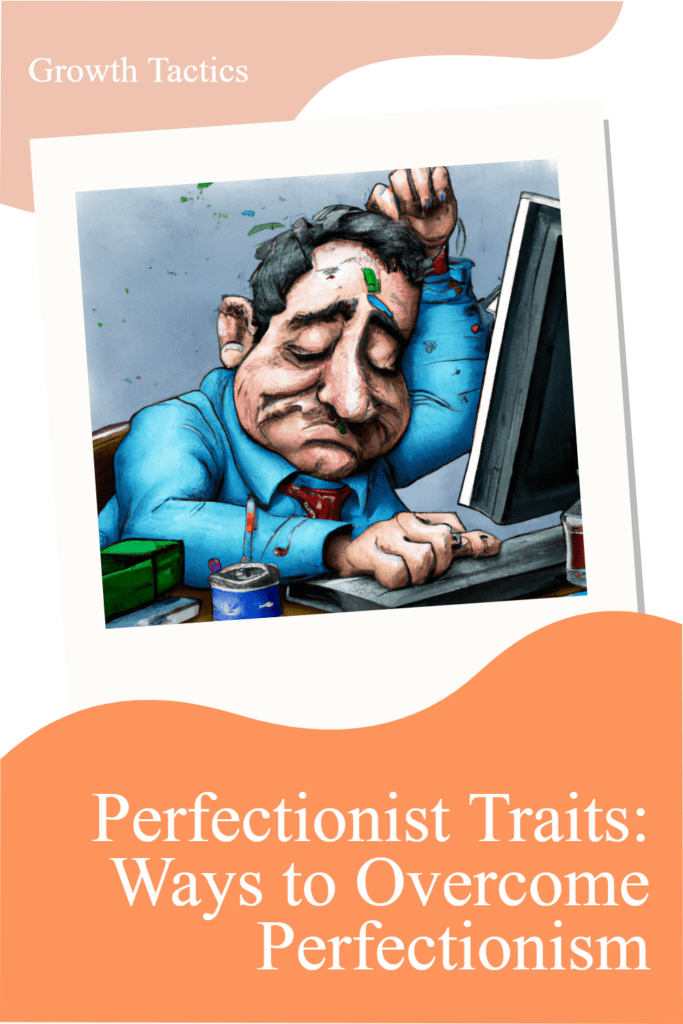Do you often find yourself getting caught up in striving for perfection so much it holds you back from actually producing a good result? If so, you may be dealing with perfectionist traits. Perfectionist traits can be both beneficial and detrimental to personal growth, depending on how effectively they are managed.
Understanding the common characteristics of perfectionism helps to identify it within yourself, as well as effective strategies for overcoming its potentially negative impacts. In this article, we’ll dive into some of the most common perfectionist traits and explore ways to effectively manage them.
Jump To Section
What Is Perfectionism?
Perfectionism is a personality trait that refers to the tendency of people to strive for perfect or extremely high standards in their work, personal lives, and relationships. Perfectionists often have high expectations for themselves and for others, which can create stress and difficulty in meeting goals. They also tend to make more mistakes than people who do not have a perfectionistic personality traits.
While perfectionism can be a helpful tool in achieving excellent results, it can also be harmful if it becomes an obsessive habit. In healthy perfectionism, the goal is to balance striving for excellence while accepting responsibility for one’s own mistakes.
What Causes Perfectionism?
What causes perfectionism? Some people may be born with a strong sense of needing to be perfect, while others may develop it as a result. Perfectionism can be caused by a range of mental issues, such as OCD (obsessive-compulsive disorder), or personality traits such as self-criticism. The following are some reasons people suffer from perfectionist tendencies.
All-or-Nothing mentality
People with an all-or-nothing mentality try to do everything perfectly, or not at all. This can lead to them being very anxious and stressed out, as they are always worried about making mistakes. It can also be difficult for them to take risks, as they may feel they have to achieve 100% success in every situation. In short, an all-or-nothing mentality is detrimental to both your mental and physical health.
Being too critical of yourself and others
Being too critical of yourself and others can lead to perfectionism. This often results in people feeling overwhelmed, stressed, and unhappy. It is important to try to be less critical of yourself and instead look at your achievements in a positive light. When you are positive and focused on your goals, you will be more likely to achieve them.
Letting fear push you

If fear of failure has you in its grip, it’s a signal that perfectionism might be overstepping its bounds. Let’s get one thing straight: failure isn’t a dead end; it’s a stepping stone on the path to success. Many missions aren’t accomplished without multiple attempts. Each failure is a lesson, a vital piece of intelligence that guides you toward your ultimate objective.
Embrace your fear; it’s a companion on the journey to excellence. Give yourself permission to try, to stumble, and to rise again. Your resilience will not only reveal unexpected outcomes but also build the fortitude you need for sustained success. In every endeavor, let purpose drive your actions, and remember, true growth stems from the courage to face the unknown.
Setting your standards too high
Striving for excellence is not a bad thing, but setting your standards too high can lead to perfectionism. It can create a constant feeling of inadequacy, a relentless whisper that you never measure up. Remember, leadership and growth aren’t about flawless execution. They’re about setting realistic, achievable standards that propel you forward without weighing you down.
Strive to be ambitious, but also realistic. Evaluate what truly matters in your journey and set standards that reflect that purpose. Avoid overthinking, which can paralyze progress. Instead, cultivate adaptability. Understand the importance of going with the flow.
Your unique approach, guided by realistic benchmarks and a clear sense of purpose, will drive you further than unattainable ideals ever could. Embrace your journey, imperfections and all, with resilience and determination.
Focusing too much on results
Achieving perfect results might seem advantageous at first glance, but in reality, it can be detrimental. When you relentlessly pursue perfection, you risk losing sight of what truly matters, ultimately stalling your progress.
It’s essential to set realistic goals and accept that mistakes are part of the journey. This approach not only paves the way for remarkable accomplishments but also ensures you enjoy the process.
Reflecting on my experience in the Air Force, I’ve seen firsthand how important it is to balance ambition with pragmatism. Successful missions often hinge on adaptability and sound judgment rather than a flawless plan.
Letting unmet goals take control
People who are usually categorized as perfectionists tend to let unmet goals inhibit their future performance. This might be because they think that if they don’t meet their standards then they will look bad in the eyes of others or it might just be a habit that they have become used to.
Either way, it is important to try and break this habit to achieve better results in the long run. When working towards a goal, do not let yourself get bogged down by what you believe are unimportant details. Instead, focus on the bigger picture and see how you can make your goals a reality.
Is perfectionism bad?
Perfectionism can be good or bad, depending on how often it is used and what the results are. If perfectionism is used excessively and leads to a lack of results, then it can be considered bad. However, if perfectionism is used responsibly and leads to better results than if it wasn’t used at all, then it can be considered good. It is important to use perfectionism responsibly so that you can achieve your goals and improve your skills.
Perfectionist traits and characteristics
Understanding the nature of perfectionism helps us navigate its challenges and tap into its potential. Here are some of the tell-tale signs of a perfectionist:
- Highly Driven and Goal-Oriented:
- Perfectionists set ambitious targets and are constantly pushing themselves to achieve them.
- This drive can lead to overworking and elevated stress levels, often overshadowing their well-being.
- Self-Critical:
- They tend to scrutinize their abilities and performances rigorously.
- This intense self-criticism can deter them from taking risks and advancing in personal or professional spheres.
- Obsessive Focus:
- A pronounced fixation on details and precision can impede broader progress.
- This narrow focus may cause them to lose sight of what truly matters in their journey.
Despite these challenges, some perfectionists do manage to reach impressive heights. However, it takes a lot of patience and determination. Two qualities that tend to be in short supply for many people. So if you’re struggling to overcome any of the traits mentioned above, don’t fret. There are plenty of ways to work through these challenges and reach your full potential.
Perfectionism and burnout
Perfectionism is often associated with a high standard of excellence. Perfectionists believe that if they don’t make every effort, there is a very high chance that they will not meet that standard. This can lead to feelings of anxiety, stress, and even burnout.
The high standards that perfectionists seek can be impossible to reach and often result in needless stress and pressure. This can cause a person to feel overwhelmed and unable to complete their work or tasks due to the intense pressure they are under. In extreme cases, perfectionism can become a mental disorder, resulting in serious damage to the individual’s well-being.
Tips to overcome perfectionism

Practice Self-Compassion
We all have moments when we feel down about ourselves. It can be difficult to practice self-compassion, especially if we’re perfectionistic. But it’s important to remember that everyone makes mistakes and everyone has times when they don’t feel good about themselves.
Self-compassion doesn’t mean self-pity. It means understanding and accepting ourselves as we are right now. When we practice self-compassion, we learn to be kind to ourselves even when we don’t feel up to it.
Be more flexible
Perfectionism can be a very rigid mindset and can prevent people from adapting to changing circumstances. But with training and practice, anyone can become more adaptable, and able to adjust their behavior and attitude to achieve their goals.
By being flexible, you’ll not only be able to more easily adapt to new situations, but you’ll also set yourself up for success in the future.
Step out of your comfort zone
To stop being a perfectionist, you need to get out of your comfort zone. To escape our comfort zones, we need to be willing to put ourselves out there and experiment a little bit. There’s no shame in trying new things or taking risks as long as you’re comfortable with the results. After all, life is too short to waste time stuck in our own little world.
Understand that mistakes will happen
Don’t be afraid of making some mistakes. It’ll help you learn and grow. Making mistakes isn’t always a bad thing. It shows that you’re willing to take risks, try new things, and expand your horizons. So start taking some leaps, and see where life takes you!
Stop going back over your work
People who are classified as perfectionists tend to spend a lot of time going over their work, in an effort to make sure that it is perfect. Sometimes, the first draft is good enough and doesn’t need to be changed.
However, perfectionists often become obsessed with their work and lose sight of other aspects of their lives. Try to relax and stop being worried about making mistakes. This will make it much easier for you to achieve your professional goals.
Don’t be too critical of yourself
If you’re a perfectionist, you may feel like you’re never good enough. It’s hard to be perfect in every instance, but that doesn’t mean you have to beat yourself up. Try to remember that it’s impossible to be perfect, and focus on doing your best. Don’t be too critical of yourself, and you’ll be more likely to see the success and happiness you deserve.
Stop comparing yourself to others

People who are considered to be perfectionists tend to compare themselves to others to measure their worth. They often become extremely anxious and worried about how they measure up in comparison. This can lead to a lot of self-judgment and stress.
It is important to remember that everyone is different and that comparing yourself to others is not always a fair or successful process. Instead, focus on your own accomplishments and strive for excellence in what you do.
Stop spending so much time on the small details
We often try to be too perfect and spend too much time on the small details, but is it really worth it? It’s important to remember that the small details don’t matter as much as we think they do. These small details can take up a lot of our time. It’s important to determine if the small details are actually worth the effort. Cutting corners is not always a bad thing.
Trust your gut
Trust your gut! First instincts are often correct. Don’t be afraid to make decisions based on what feels right to you, without second-guessing yourself. The second-guessing part is something perfectionists often struggle with. Try to eliminate the second-guessing as much as you can.
Celebrate your successes

Everybody enjoys success once in a while and that includes perfectionists. Perfectionists tend to forget to celebrate success even when something goes right it’s not good enough, and that can be detrimental to their mental health in the long run.
When you DO celebrate your successes, make sure it’s done in a way that makes you happy and doesn’t put too much pressure on yourself. Remember, life is full of bumps in the road and sometimes things don’t go as planned, but that doesn’t mean you can’t still achieve your goals. Just take a deep breath, roll with the punches, and keep going!
Ask for help if you need it
If you’re feeling overwhelmed by your perfectionism, it’s OK to ask for help. You don’t have to be perfect, and trying to meet unrealistic goals can lead to frustration, anxiety, and even depression. Talking about your concerns with a trusted friend or family member can help you feel better and make progress. You may also find that a therapist can provide helpful support and resources.
Try to not overthink it
If you want to achieve something, you mustn’t overthink things. This can lead to frustration, as overthinking can make it difficult to get things done. The key is to focus on the task at hand, and then take steps toward completing it. If you find yourself constantly worrying about what could go wrong or how you can improve upon a previous step, try to stop and take a breath. Stopping yourself from overthinking will help you out a lot in the long run.
Did you enjoy this article on perfectionist traits and how to overcome them? Please share and subscribe below.


